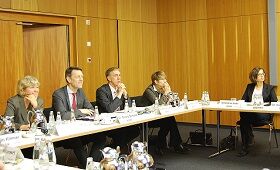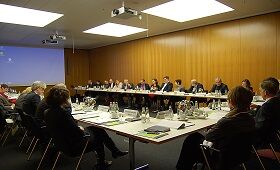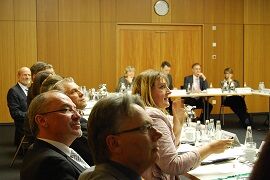Round table at state secretary level in Berlin on 3 March
The themes of the round table for international collaboration in vocational education and training at state secretary level which took place on the 3 March in the Federal Ministry of Education and Research (BMBF) in Berlin were the refugee situation both within Germany and beyond, the opening of Iran and the UNESCO recommendation relating to vocational education and training.

The host, State Secretary Dr. Georg Schütte, initially welcomed the stakeholder representatives involved in collaboration in vocational education and training. Foreign Office representative Dr. Tilo Klinner and the representative of the Federal Ministry for Economic Cooperation and Development (BMZ), Hans-Peter Baur, also made some introductory remarks. The first topic of the day was the political support for the export of vocational education and training. Head of iMOVE, Ulrich Meinecke, reported on progress made as a result of the involvement of education industry in Ministers’ visits. He pointed out that, for example, education industry interests were addressed as part of visits made by the Federal Ministry of Education and Research (BMBF) and the Federal Ministry of Labour and Social Affairs (BMAS).

Information was then shared on the theme of refugees. The respective Federal Ministries presented broad range of measures for managing the situation at home and abroad. Besides the Federal Ministries, other organisations including the Association of Germany Chambers of Industry and Commerce (DHIK), the German Society for International Cooperation (GIZ), the Central Office for Continuing Education in Skilled Trades (ZWH) and also the Länder are all very actively involved in integration projects. Susanne Hoffmann, , representing the BMAS, reported in this regard on the priorities of the BMAS strategy in the areas of young people, language courses and recognition. She also presented measures for the Western Balkans. On behalf of the Federal Ministry of the Interior (BMI), Roland Conradt outlined current developments in rights of residence with particular reference made to the so-called “Asylum package 2”.
A discussion also took place regarding how to deal with Iran in terms of collaboration in vocational education and training after the end of UN sanctions. Delegations of ministers and Länder have been visiting since the opening up of the country. How are the individual ministries and intermediary organisations currently dealing with Iran? What position should be adopted in the future? Those attending the round table discussed these questions. It was agreed that, following this initial sharing of information, the discussion regarding opportunities for collaboration in vocational education and training should be continued with Iran as soon as possible.

The final item on the agenda, the UNESCO recommendation relating to vocational education and training was presented by Birgit Thomann from the Federal Institute for Vocational Education and Training. The recommendation contains guidelines for the implementation and continued development of vocational education and training in member states, such as priorities of job market orientation or the importance of company-based learning.
The next round table at State Secretary level will take place on 22 September 2016.
GOVET work includes the role of administrative office for the round table for international collaboration in vocational education and training. Representatives of the main stakeholders involved in collaboration in vocational education and training regularly come together at different levels at the round table.